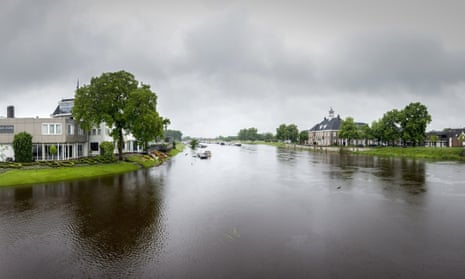The first public hearings will take place in the Hague on Tuesday in the first case in the world to use existing human rights and tort law to hold a government responsible for failing to reduce carbon emissions fast enough.
The 886 citizens involved in the class action against the Dutch government aim to force it to take more robust action to reduce emissions. They also hope to offer a legal solution to the political impasse on international climate change action.
They will ask the judiciary to declare that the Dutch government must implement policies to reduce its emissions by between 25% and 40% below 1990 levels by 2020. This was the target for developed nations – established by the Intergovernmental Panel on Climate Change (IPCC) – as necessary to create a 50% chance of avoiding a dangerous 2C rise in global temperatures.
The European Union recently set a target of reducing emissions by 40% by 2030, ahead of a crunch conference in Paris at the end of the year.
The lawsuit has been brought by the sustainability foundation Urgenda with 886 Dutch citizens acting as co-plaintiffs including teachers, entrepreneurs, artists and children legally represented by their elders.
Dennis van Berkel, who works for Urgenda, said: “We wanted to show that this is not just one organisation that had an idea but it’s a broad movement of people who are very concerned about climate change and believe it’s necessary to sue the state over it.”
Hundreds are expected to pack out the court on Tuesday, with the hearing due to be live streamed for those who cannot fit in the building. Many others from around the world submitted ideas for the case.
Joos Ockels is among the plaintiffs. Her late husband, Wubbo Ockels, who was the first Dutch citizen in space, had dedicated much of his later years to environmental work, founding the renewable energy foundation Happy Energy and declaring that citizens must care for the planet as “astronauts of spaceship Earth”.
In a speech from his bedside days before his death last year Ockels pleaded to camera: “What is wrong with our mindset? Our earth has cancer. I have cancer too. If I could take you to space you would see that this is your only planet, you have no spare.”
The national weatherman, Reinier van de Berg, and the prolific Dutch DJ, Gregor Salto, are acting as plaintiffs, with the Nasa climate scientist Prof James Hansen also supporting the campaign.
Salto, who is an ambassador for WWF, said: “Everybody is waiting for the government to take action but the government has done so little. If the case succeeds, they will be forced to take action. If you look at Denmark, they’ve managed [to reduce emissions], so why can’t we? I want the Dutch to lead the way in this.”
In the 1990s the Netherlands was hailed as one of the first countries to take climate change seriously, but the country now lags a long way behind its targets on renewables. A low-lying country, it is at higher risk from rising sea levels and storm surges in comparison to other developed nations.
The campaigners hailed a breakthrough with the launch of the Oslo Principles on Global Climate Change Obligations in London two weeks ago. Created by a group of prolific judges, advocates and professors, they argue that in failing to introduce adequate policy to tackle climate change, governments have already broken existing human rights, environmental and tort laws, regardless of agreements brokered at the international level.
The case is now nearing its end with a verdict expected within six months. Urgenda first took action in 2012 when they sent a letter to the Dutch government asking them to introduce new measures to cut emissions, without which they would proceed to court.Urgenda hopes it will set a precedent and inspire others around the world to take up similar cases. Lawyers in Belgium – supported by 8,000 citizens – are currently preparing for court proceedings against their own government.
Urgenda and Ockels were inspired to take action by ideas set out in a book written by Roger Cox, the lawyer now leading the case. Five years in the making, Revolution Justified argues – alongside other legal experts – that the judiciary can play a fundamental role in tackling climate change.
Cox said: “We’re now 23 years down the road of the climate change treaty and it’s obvious that international politics has not brought much good to the world. The power of politics, fossil fuel companies and the banks are so large but there is one other powerful system with a lot of wisdom and that is the law.”
He continued: “There is a parallel here with the situation in the 1950s in the United States. It was the courts that decided that segregation in schools was not constitutional. It wasn’t a big issue in society and it wasn’t political but it was a few people fighting and the courts following up that created a huge change in American society.”

Comments (…)
Sign in or create your Guardian account to join the discussion